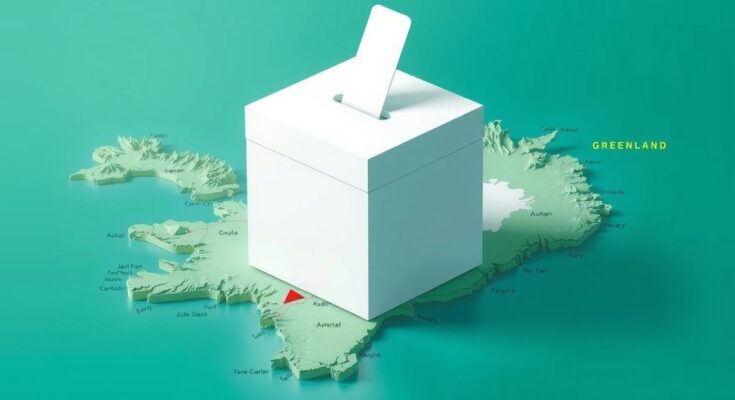Greenland is holding crucial parliamentary elections amidst heightened international interest from President Trump, who aims for control over the strategically important island rich in rare earth minerals. Residents, predominantly Indigenous Inuit, seek independence and greater self-governance while maintaining positive relations with the U.S. The electoral process reflects local priorities and challenges, including environmentally conscious economic growth.
Greenland is set to conduct significant parliamentary elections amid heightened global attention, particularly from the United States. Voters in the capital city of Nuuk will participate at the only polling station available, as U.S. President Donald Trump expresses keen interest in the strategic Arctic island, known for its rare earth minerals essential for the global economy. Though Trump’s aspirations are not part of the ballot, they weigh heavily on voters’ minds.
Home to approximately 56,000 individuals, primarily of Indigenous Inuit descent, Greenland has pursued a path to self-determination since 2009. As citizens gather to debate their future, Pipaluk Lynge, a member of the ruling United Inuit party, emphasizes the community’s concerns regarding Trump’s interest, stating that there is a desire to strengthen ties with European nations to secure their sovereignty.
Polls indicate a strong preference among Greenlanders for independence, contradicting any inclination towards U.S. governance despite generally favorable relations with American entities, such as the Pituffik Space Base. This sentiment is echoed by local fisherman Gerth Josefsen, who, despite his support for Trump, affirms the importance of self-determination.
Doris Jensen of the Siumut party acknowledges that Trump’s focus has accelerated discussions on independence. The local political climate has shifted, with international media presence indicating the significance of these elections. Prime Minister Mute Bourup Egede recently encountered overwhelming media coverage post-debate, a situation noted by local resident Aviaja Sinkbaek, who expressed her concerns regarding the situation’s gravity.
The electoral process in Greenland features a distinct atmosphere, characterized by calm and respectful campaigning. Significant issues include workforce development and the operations of newly constructed infrastructure, such as the airport capable of accommodating large aircraft. Election day will see a lively atmosphere, with political parties promoting their platforms outside the polling station.
As the voting unfolds, preliminary results will emerge shortly after polls close, although verification will take longer due to the island’s challenging geography. The vastness of Greenland, the twelfth-largest country globally, adds complexity to the electoral process, necessitating transporting ballots from remote areas. Greenlanders remain optimistic about leveraging their mineral resources to boost their economy while adhering to stringent environmental preservation policies.
In summary, Greenland’s parliamentary elections are taking place against the backdrop of significant geopolitical interest from the United States, particularly from President Trump. The desire for independence among the populace is prominent, reflecting a collective wish to maintain sovereignty and control over their future. As the election unfolds in a uniquely local democratic context, the outcome will significantly impact Greenland’s path towards greater autonomy and economic diversification.
Original Source: www.2news.com




